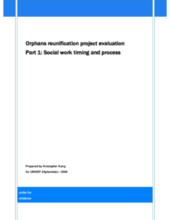Poverty, conflict, and other risk factors in Afghanistan contribute to a situation where many families are vulnerable to breakdown. There is a systemic lack of support, diversion, and alternative care services available for these families. Where parents are unable to provide for their children, residential care is the only recourse.
The Department of Orphanages is responsible for the administration of orphanages at the national level and is situated in the Ministry of Labour, Social Affairs, Martyrs, and Disabled (MOLSAMD). MOLSAMD sources suggest that there are between six and eleven thousand children living in institutional care in Afghanistan, though neither administrative body possesses recent, reliable data on the total number of orphanages, their condition, or the number of children living in residential care. Previous reports consistently lament the disrepair of existing residential care facilities, the lack of regulatory mechanisms at any level, the indiscriminate and inconsistent admissions policies, the inadequate numbers and qualifications of orphanage staff, and the continued expansion of residential care services in Afghanistan.
The Orphans Reunification Project (ORP) began in May 2006 with the goal of reunifying and reintegrating 400 children from two State-run Kabul orphanages over a one-year period. ORP operated through work of a small team of MOLSAMD social workers based out of Tayhee Maskan Orphanage. These social workers were responsible for identifying children as candidates for reunification and reintegration, linking children with their families, and providing ongoing support during and after the process of children returning to family care.
For each child returning home, families were provided with 12,000 Afs to establish a microbusiness enterprise of their own choosing, and 500 Afs to provide basic school supplies. ORP social workers were to follow each case after the child returns home to facilitate transition to life in a family environment and continued commitment to school. Despite finishing only 363 of the targeted 400 reintegration cases, MOLSAMD is aiming to start another phase of reintegration programming in Kabul and other provinces. MOLSAMD and UNICEF have commissioned a full evaluation of ORP implementation to guide the development of subsequent reintegration programming for children in residential care in Afghanistan.
This report seeks to assess in particular the quality of ORP social work. Social work constitutes the vast majority of program operations, and effective social work is critical to successful operations. In its absence reintegration simply would not work: children seeking reunification would not be considered, families would not be contacted or counselled, children returning home might never return to school, and could end up working, abandoned, or back in residential care.
A complete assessment for the quality of social work in the context of a reintegration program captures a combination of the pattern of visits over time, the depth and nature of each visit, and the associated short and long term outcomes for children. This analysis addresses the first of these criteria by charting the “timing and process” of ORP social work. The primary goal of this analysis is to use the timing and process of ORP social work to identify gaps in operations that might undermine effectiveness at the program and case level. This analysis will also provide recommendations to address these gaps during the next phase of reintegration programming.

